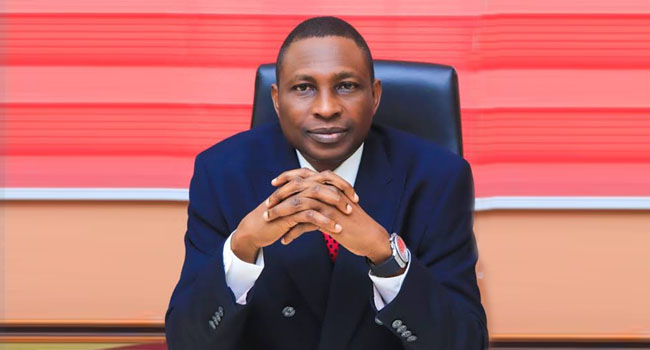EFCC chief demands returns of embezzled funds hidden overseas
Mr. Ola Olukoyede, chair of the Economic and Financial Crimes Commission (EFCC), has demanded the immediate and unconditional return of any stolen assets from Nigeria that are being held abroad.
This was said by Olukoyede in a statement made by Dele Oyewale, the EFCC Spokesperson, in Abuja on Wednesday.
According to Oyewale, Olukoyede made this request during the current 10th session of the Conference of State Parties (COSP) to the United Nations Convention Against Corruption (UNCAC) in Atlanta, Georgia, USA.
In his view, the return of stolen assets held abroad is now crucial to the development of the Nigerian economy and the opening of new horizons for growth both domestically and internationally.
He made the point that no country should hold on to stolen riches as financial and economic crimes had gone global.
We require the assistance of every nation that is responsible for storing or guarding these looted African assets.
As nations that stand with us in our battle against corruption, it is crucial that we view you as partners in our effort. These days, corruption is seen as a crime that spans international borders.
By clinging to those assets, you’re making it extremely difficult to retrieve them legally. When you do this, you are essentially giving the criminals a green light to do what they want.
Because the type of financial crimes we are discussing has gone global, it tends to impact you as well when you promote it in Africa.
“Therefore, your cooperation with us is now crucial,” he stated.
Nigeria has “probably done much more than any other country, perhaps the whole world, in the area of asset recovery,” according to the head of the Economic and Financial Crimes Commission (EFCC), who made the comment while addressing a worldwide audience about the country’s asset recovery efforts and triumphs to date.
It is largely due to the regulatory and legal framework that the Nigerian government has established that we have been successful.
Some of the steps previously done were mentioned by him: using current laws on civil forfeiture of assets, passing the Proceeds of Crimes(Prevention and Prohibition) Act, 2022,
There were others, he added, such banking reforms that require a Bank Verification Number (BVN) for every consumer transaction.
He claimed this would pave the way for the EFCC and other anti-corruption organisations to recover stolen funds by uncovering their whereabouts and bringing those responsible to justice, both in Nigeria and abroad.
Civil forfeiture is permitted by a provision of our legislation.
Our ability to recover assets has been substantially aided by the practice of civil forfeiture, in which an offender’s assets can be quickly attached and forfeited without necessarily leading to a criminal conviction.
We also attempted to implement another component a year ago.
Asset recovery in Nigeria is now governed by a series of laws and regulations put in place by the Proceeds of Crime Act.
“Furthermore, our capacity to work together and engage with the international community to emphasise that the individuals responsible for the theft and the nations that have benefited from it are equally responsible,” he stated.
He stressed again how important it is for the international community to back Nigeria’s attempts to retrieve stolen assets.
“If you are not prepared to assist us in recovering assets that have been traced to your jurisdiction, we will not consider you a friend,” he stated.
He spoke highly of President Bola Tinubu’s bravery and dedication in spearheading anti-graft efforts including the EFCC’s asset recovery programmes.
He reassured the international community that Nigeria’s finances were now more strictly regulated.
The speaker emphasised that Nigeria is prepared to manage its financial system in an accountable and open manner, as pledged by President Bola Tinubu to the international community.
In his defence of his preventative framework, Olukoyede repeatedly emphasised its potential to revolutionise anti-corruption efforts.
Furthermore, I can assure you that our organisation is prepared to implement stringent preventative measures, which we have already begun in Nigeria.
One of my policy goals since taking office more than a month ago has been to combat financial crimes and corruption in Nigeria through the instrumentality of prevention.
You can save money by avoiding enforcement rather than enforcing it.
That is something we are clinging to. He reaffirmed his commitment to hold those responsible and make sure everyone knows how the recovered funds will be used moving ahead.
According to Oliver Stolpe, the country director of the United Nations Office on Drugs and Crime in Nigeria, Nigeria has been recognised as the “world’s champion in asset recovery” for its successful asset recovery initiatives.
“Nigeria has been at the forefront of asset recovery on the African continent and, in my opinion, the world’s champion in this field. When compared to other African countries, you have a far higher number of cases and a lot more money that has been recovered,” he stated.




